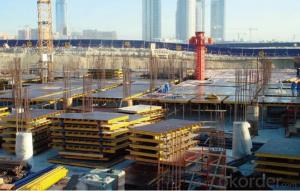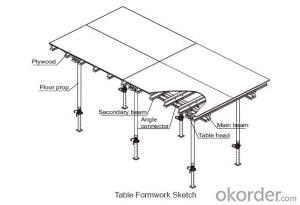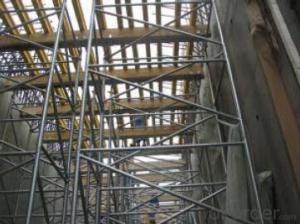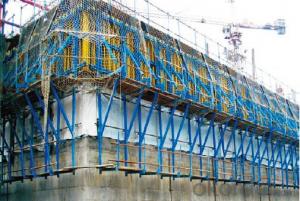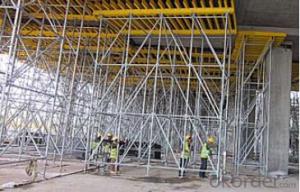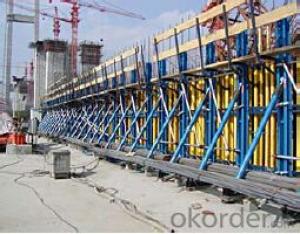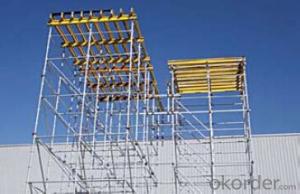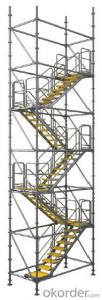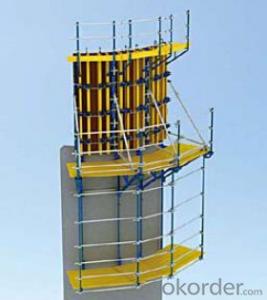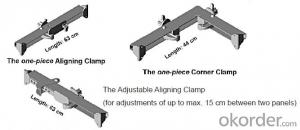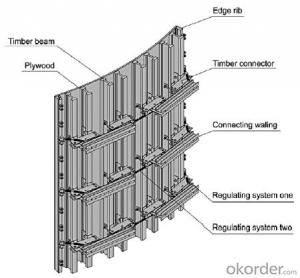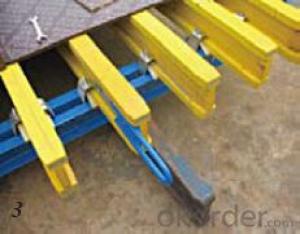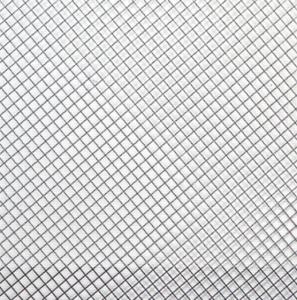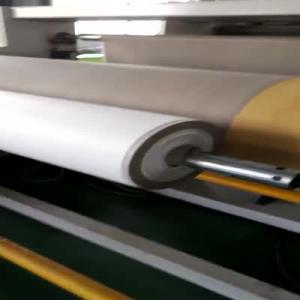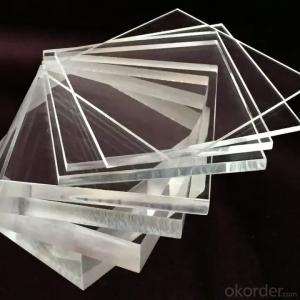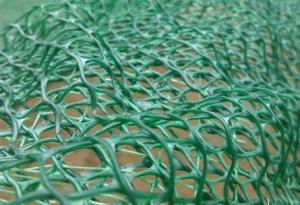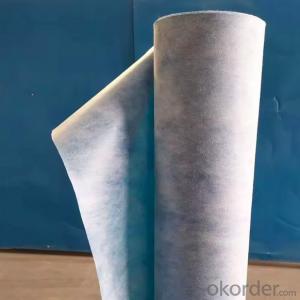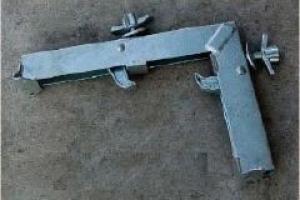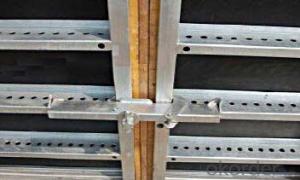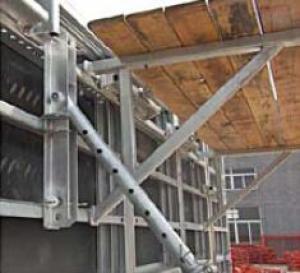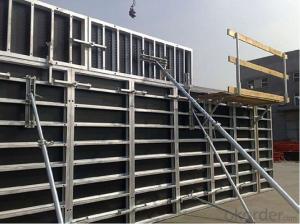Tabel-formwork for Formwork and Scaffolding systems
- Loading Port:
- Tianjin
- Payment Terms:
- TT OR LC
- Min Order Qty:
- 50 m²
- Supply Capability:
- 1000 m²/month
OKorder Service Pledge
Quality Product, Order Online Tracking, Timely Delivery
OKorder Financial Service
Credit Rating, Credit Services, Credit Purchasing
You Might Also Like
Tabel Formwork:
Table formwork is the most typical application for slab, with timber beam, the slab formwork is
light weight, fast and economic in the construction.
Characteristics:
◆ Simple structure, easy assembly.
◆ Flexible structure, be adapted to different support system.
◆ High construction efficiency with special system tools.
1. Lifting fork for lifting the table formwork to upper floor.
2. Trolley for moving the table formwork on floor.
◆ Flexible application with stand alone props.
◆ Safer condition with handrails.
- Q:Are there any limitations or disadvantages of using steel formwork?
- There exist certain limitations and drawbacks associated with the utilization of steel formwork. One constraint pertains to the cost. Comparatively, steel formwork tends to be more expensive in comparison to alternative formwork types, such as wood or aluminum. Consequently, it may not be a practical choice for projects operating within tight budgetary constraints. Another limitation involves the weight and unwieldiness of steel formwork. Its substantial weight makes transportation and handling challenging, potentially necessitating additional equipment and labor. Moreover, the bulkiness can complicate the storage and stacking of the formwork when not in use. The assembly and disassembly of steel formwork also require skilled labor. Unlike certain formwork types like modular or reusable plastic formwork, steel formwork often necessitates custom-made fittings at the construction site. This can lead to increased labor costs and elongated construction timelines. Additionally, without proper maintenance, steel formwork is susceptible to corrosion. Exposing it to moisture, chemicals, and harsh weather conditions can result in rusting, thereby weakening the formwork over time. Regular inspections and maintenance are indispensable for ensuring the longevity and safety of steel formwork. Lastly, depending on the nature of the construction project, steel formwork may not be suitable. Its rigidity and lack of flexibility make it less adaptable to complex or irregular shapes. Consequently, alternative formwork materials or systems may prove more suitable in such instances. Despite these limitations and disadvantages, steel formwork also presents several advantages, including durability, reusability, and a high load-bearing capacity. Consequently, it is crucial to thoughtfully consider the project's specific requirements prior to making a decision on whether to employ steel formwork.
- Q:What are the different types of steel formwork accessories available?
- Some common types of steel formwork accessories include form ties, formwork clamps, anchor bolts, formwork brackets, formwork connectors, and formwork spacers. These accessories are essential for ensuring the stability and proper alignment of the formwork system during concrete construction projects.
- Q:Are there any health concerns associated with steel formwork?
- Yes, there are potential health concerns associated with steel formwork. These concerns mainly revolve around the use of hazardous chemicals such as paints, coatings, or sealants that may contain volatile organic compounds (VOCs). Prolonged exposure to these VOCs can lead to respiratory issues and other health problems. Additionally, the handling of heavy steel formwork components can pose risks of musculoskeletal injuries if proper safety measures are not followed. It is important to ensure proper ventilation, use protective gear, and follow safety guidelines to mitigate these health concerns.
- Q:Is steel formwork suitable for projects with high formwork reusability?
- Projects that require frequent formwork reuse benefit greatly from using steel formwork. Steel formwork is renowned for its durability and strength, enabling it to endure numerous uses without substantial damage. Its assembly and disassembly are effortless, making it highly efficient for reuse on various projects. Moreover, steel formwork guarantees a polished and uniform concrete structure, delivering exceptional quality results. Although steel formwork may initially have a higher price tag compared to alternative formwork types, its extended lifespan and reusability make it a financially prudent choice for projects demanding frequent formwork reuse.
- Q:How does steel formwork affect the concrete curing process?
- Construction projects commonly utilize steel formwork as temporary molds for pouring concrete, and its presence can have a significant impact on the curing process of the concrete. To begin with, the utilization of steel formwork allows for better control over the shape and dimensions of the concrete structure, thanks to its smooth and rigid surface. This results in even and uniform pouring of the concrete, leading to a more consistent curing process. Additionally, the smooth surface of the steel formwork aids in achieving a superior finish on the concrete surface. Furthermore, steel formwork provides stability and support to the concrete during the curing process, preventing any sagging or deformation caused by its own weight, particularly in vertical or overhead structures. This support enables the concrete to cure properly, devoid of any distortions or cracks, ultimately resulting in a structurally sound and durable final product. Moreover, the presence of steel formwork acts as a barrier, preventing the loss of moisture from the concrete during curing. Adequate moisture is crucial for the proper hydration of cement particles, which is essential for attaining the desired strength and durability of the concrete. By retaining moisture and creating a favorable environment for the curing process, steel formwork reduces the risk of shrinkage and cracking. Furthermore, steel formwork also has the ability to influence the curing time of the concrete. Its high thermal conductivity allows for the dissipation of heat from the concrete, thereby expediting the curing process. This feature can be advantageous in specific situations where faster curing is required, such as in cold weather conditions or time-sensitive construction projects. In conclusion, the presence of steel formwork is vital in the concrete curing process due to its ability to provide a smooth surface, stability, moisture retention, and influence on the curing time. By ensuring a consistent and high-quality curing process, steel formwork contributes to the creation of durable and well-finished concrete structures.
- Q:Can steel formwork be used for hospital construction projects?
- Yes, steel formwork can be used for hospital construction projects. Steel formwork is a versatile and durable construction material that offers several advantages for hospital projects. It provides excellent strength and stability, which is crucial for ensuring the safety and integrity of the building. Steel formwork also allows for efficient and precise construction, as it can be easily assembled and disassembled, and its modular nature allows for flexibility in design and layout changes. Additionally, steel formwork has a smooth surface finish, which is important for maintaining a hygienic environment in a hospital setting. It is also resistant to moisture and chemicals, making it suitable for areas that require frequent cleaning and sterilization. Overall, steel formwork is a reliable and suitable choice for hospital construction projects.
- Q:What are the different types of steel formwork supports?
- There are several types of steel formwork supports, including adjustable steel props, steel beams, steel frames, and steel tubes.
- Q:How does steel formwork contribute to the overall efficiency of concrete construction?
- Steel formwork contributes to the overall efficiency of concrete construction by providing a durable and reusable framework for pouring concrete. It offers a high level of accuracy and precision in shaping the concrete, ensuring that the desired dimensions and finishes are achieved. This leads to a reduction in material wastage and labor costs. Additionally, the strength and stability of steel formwork allows for faster construction cycles, enabling projects to be completed on time or ahead of schedule.
- Q:Can steel formwork be used for architectural features?
- Yes, steel formwork can be used for architectural features. Steel formwork provides strength, durability, and flexibility, making it suitable for creating complex and intricate architectural designs. It allows for precise shaping, smooth finishes, and efficient construction processes, making it a popular choice for architectural features such as decorative facades, columns, beams, and other structural elements.
- Q:Can steel formwork be used for industrial construction projects?
- Yes, steel formwork can be used for industrial construction projects. Steel formwork is a versatile and durable option that is commonly used in the construction industry for various applications, including industrial projects. It offers several advantages over other types of formwork materials such as timber or plastic. Firstly, steel formwork provides superior strength and stability, making it suitable for large-scale projects that require heavy-duty support. It can withstand high pressure and loads without warping or bending, ensuring the structural integrity of the concrete being poured. Additionally, steel formwork is highly reusable, which makes it a cost-effective choice for industrial construction projects. Unlike timber formwork, which can only be used a few times before it starts to degrade, steel formwork can be used repeatedly for multiple projects. This reduces the overall construction cost and minimizes waste. Moreover, steel formwork offers excellent dimensional accuracy and consistency. It can be easily fabricated to meet specific project requirements, ensuring precise and uniform concrete shapes and finishes. This is particularly important in industrial construction, where precise measurements and high-quality finishes are often required. Furthermore, steel formwork is resistant to environmental factors such as moisture, temperature changes, and chemical exposure. This makes it suitable for various industrial settings, including manufacturing plants, warehouses, and power plants, where harsh conditions may be present. In conclusion, steel formwork is a viable option for industrial construction projects due to its strength, durability, reusability, dimensional accuracy, and resistance to environmental factors. Its use can streamline the construction process, reduce costs, and ensure the long-term stability and integrity of industrial structures.
1. Manufacturer Overview |
|
|---|---|
| Location | |
| Year Established | |
| Annual Output Value | |
| Main Markets | |
| Company Certifications | |
2. Manufacturer Certificates |
|
|---|---|
| a) Certification Name | |
| Range | |
| Reference | |
| Validity Period | |
3. Manufacturer Capability |
|
|---|---|
| a)Trade Capacity | |
| Nearest Port | |
| Export Percentage | |
| No.of Employees in Trade Department | |
| Language Spoken: | |
| b)Factory Information | |
| Factory Size: | |
| No. of Production Lines | |
| Contract Manufacturing | |
| Product Price Range | |
Send your message to us
Tabel-formwork for Formwork and Scaffolding systems
- Loading Port:
- Tianjin
- Payment Terms:
- TT OR LC
- Min Order Qty:
- 50 m²
- Supply Capability:
- 1000 m²/month
OKorder Service Pledge
Quality Product, Order Online Tracking, Timely Delivery
OKorder Financial Service
Credit Rating, Credit Services, Credit Purchasing
Similar products
New products
Hot products
Hot Searches
Related keywords
